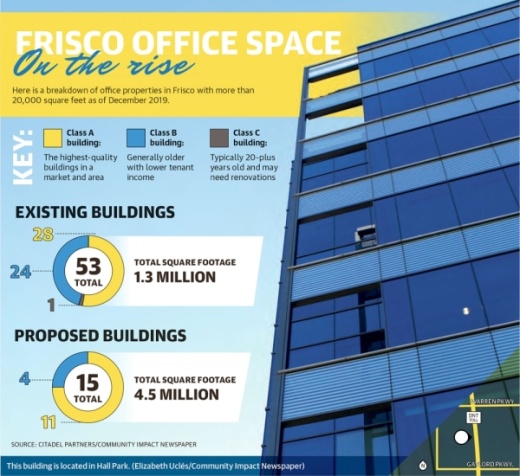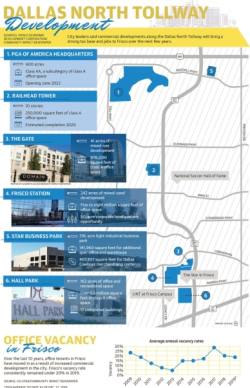Projected development in the new decade may make Frisco’s landscape more urban. In December 2019, Frisco had 1.3 million square feet of commercial space, according to Citadel Partners data. 15 proposed buildings could add another 4.5 million square feet.
“Some people are interested in an urban feel within a suburban setting,” said Ron Patterson, president of the Frisco Economic Development Corporation. “Frisco is a great place to experience that sort of a blend.”
Dallas-Fort Worth was named the fifth-largest market in the nation for flexible office space, an alternative to traditional office solutions, per a September analysis by the CBRE, a commercial real estate services and investment firm.
Corporate relocation
Frisco Station, Hall Park and The Star in Frisco are a few ongoing developments projected to add major commercial options in 2020, Patterson said.
Frisco’s business with the Dallas Cowboys and FC Dallas, as well as its ongoing partnership with the Professional Golfers’ Association of America to host its new headquarters, has given the city a competitive edge over neighboring cities, said Robert Folzenlogen, senior vice president for Hillwood, the developer for the Frisco Station project.
“All of those things put Frisco on a map to national tenants, which means it puts [Frisco] on a map for relocation potential,” he said.
Frisco Station, a 242-acre mixed-use development, could attract a corporation looking for a new headquarters. The Campus District will offer a 50-acre corporate headquarters within Frisco Station’s eight-to-10-year build out, Folzenlogen said.
Along with commercial development, Frisco Station’s master plan includes urban living, dining, retail, parks and trails. Including “live, work, play” elements in a project is key in commercial development, Folzenlogen said.
“Live, work, play” is part of what sold IT services provider Abacus Group on moving its Texas office to Hall Park from Dallas in November, Abacus Group CFO Jonathan Bohrer said.
Another such factor was Hall Park’s proximity to local universities and tech schools, such as the University of North Texas’ Frisco campus.
“That’s all part of what we hear every day and what office users are looking for—to move their companies here and be able to attract talent,” Bohrer said.
The Hall Park office also provides a class A space and close proximity to several recreational amenities, Bohrer said, such as rental bikes, a gym and food trucks.
“We wanted to show potential employees that we had a really great place to work,” he said.
Frisco is a big player in the flexible office space market, per the CBRE analysis. The Far North Dallas submarket, which includes Frisco, accounted for over a quarter of flexible office space inventory in the Dallas-Fort Worth market, per the analysis.
“It is the largest submarket by square footage,” said Blair Oden, CBRE Senior Managing Director of Occupier Services.
Developing the DNT
Hall Park’s location along the Dallas North Tollway corridor near SH 121 also played a role in Abacus Group’s choice of office location, Bohrer said.
The area encompassing Frisco and Plano is transforming into the next employment hub for the Dallas/Fort Worth area, said Robert Cox, Frisco Planning and Zoning Commission chairman.
“I think Plano and Frisco’s interests are aligned,” Cox said. “The 121/Dallas North Tollway corridor is becoming the epicenter of North Dallas, and we have a lot of opportunities coming to this area.”
The corridor also helps Frisco Station stand out among other office developments in the city, Folzenlogen said.
“The competitive difference with Frisco Station in Frisco is a compilation of this location and growth from the 121 corridor to the north,” Folzenlogen said.
The tollway will guide commercial development in north Frisco, especially as more projects, such as the PGA headquarters, arise near the tollway and the US 380 corridor, Cox said.
“There’s development in the north of the city that is going to define the north side of the city and change commuting and traffic components in Frisco,” Cox said. “One of our goals is to get a reverse commute.”
Cox said the city is working to get more commuters traveling north for work rather than toward Dallas in hopes of relieving southbound traffic on the tollway.
Fueling Frisco's economic engine
Frisco residents may save property tax dollars as a result of increased commercial development, Cox said.
“By having the commercial space,” he said, “we’re able to have more diversity in who’s paying for roads, police and so forth in Frisco—not just put it all on the back and burden the residents.”
A more sustained tax base will offer a “safety net” to citizens in the event of a recession, Cox said.
As more office space draws corporate relocations to Frisco, more jobs will become available to Frisco residents, shortening commutes as a result, Patterson said.
“One of the ways to make traffic better in Frisco is to work in Frisco,” Cox said.
Suburban to urban
Highly concentrated office, retail and residential space in the DNT/121 corridor alone has shifted Frisco from suburban to urban, Oden said.
However, Patterson said portions of Frisco will remain suburban even with the rise of urban areas.
Targeting these mixed-use spaces along the tollway is a beneficial move by the city, Folzenlogen said, as it creates a balance between urban and suburban.
“You can have the benefits of this urban density but still have single-family housing and big projects off the toll road,” he said.
Folzenlogen said this density creates shorter commutes and more employment opportunities for residents.
The city’s strict building requirements will maintain overall high standards in these urban areas, Cox said.
SkyHouse Frisco Station, a new high-rise apartment community, was required to add a green space to adhere to the city’s open space requirements. He said Frisco was the first city in the nation to require this from SkyHouse, which has 18 other locations in the U.S.
“Our open space requirements for commercial and so forth really drive the goal to have a world-class development environment,” Cox said.
While Cox sees Frisco becoming a “full-service community with urban villages” instead of becoming fully urban, he said residents will benefit from the convenience and sustainability of urban areas.
Frisco’s blend of urban and suburban areas, paired with its affordable housing options, is what makes the city “ripe for expansion,” Oden said.
“There’s no better place in the U.S. to be in the real estate business than Dallas-Fort Worth,” he said. “And Frisco and Far North Dallas [are] a perfect example of why.”






